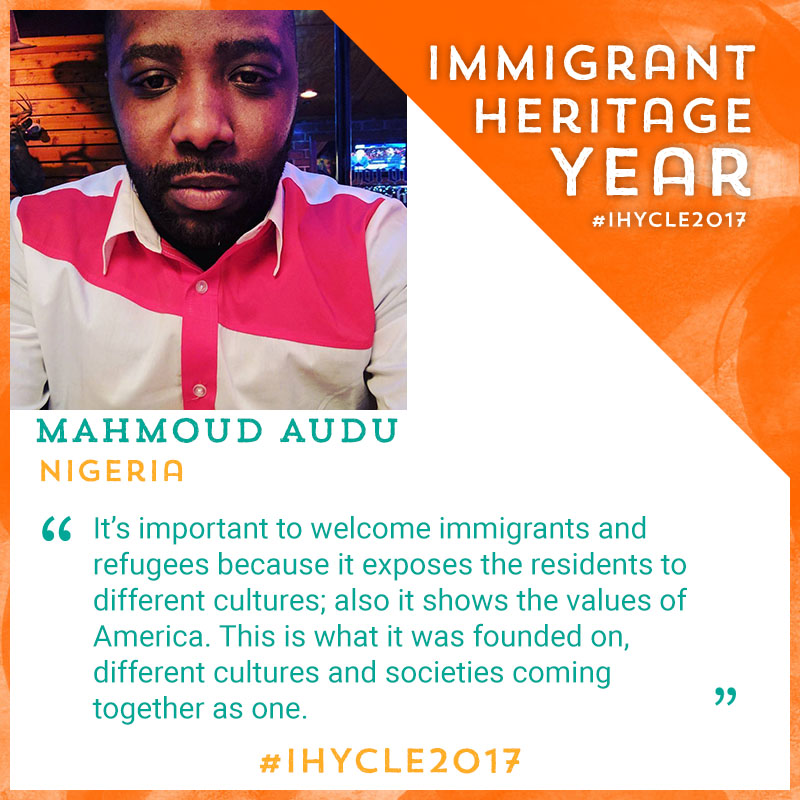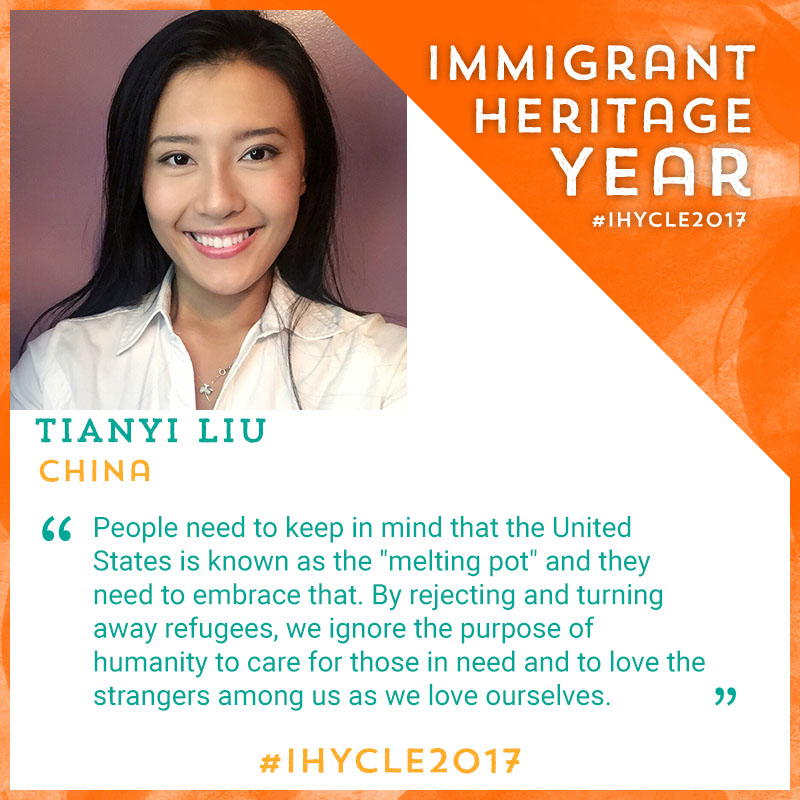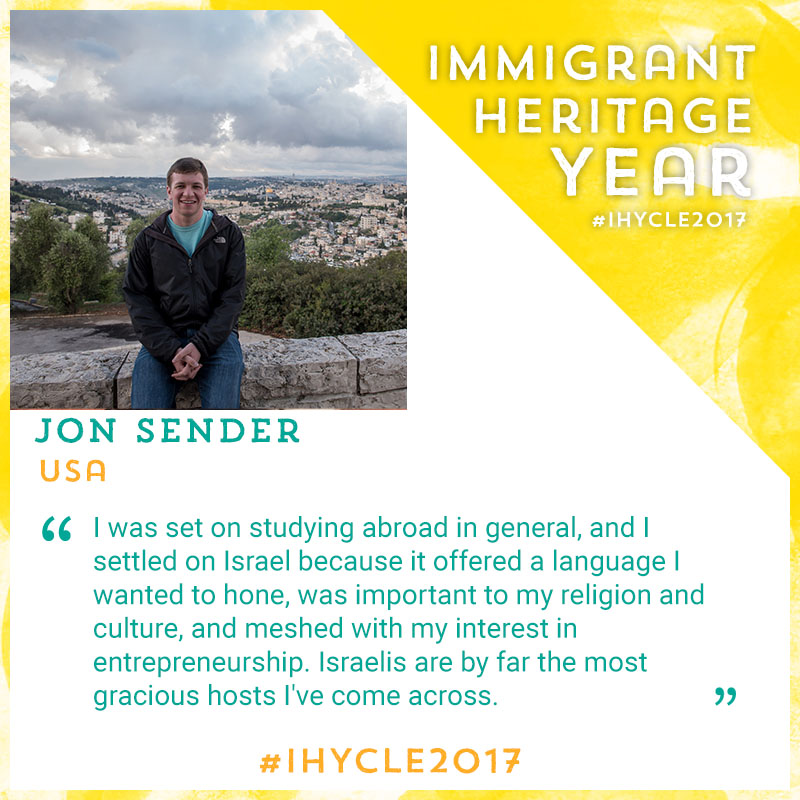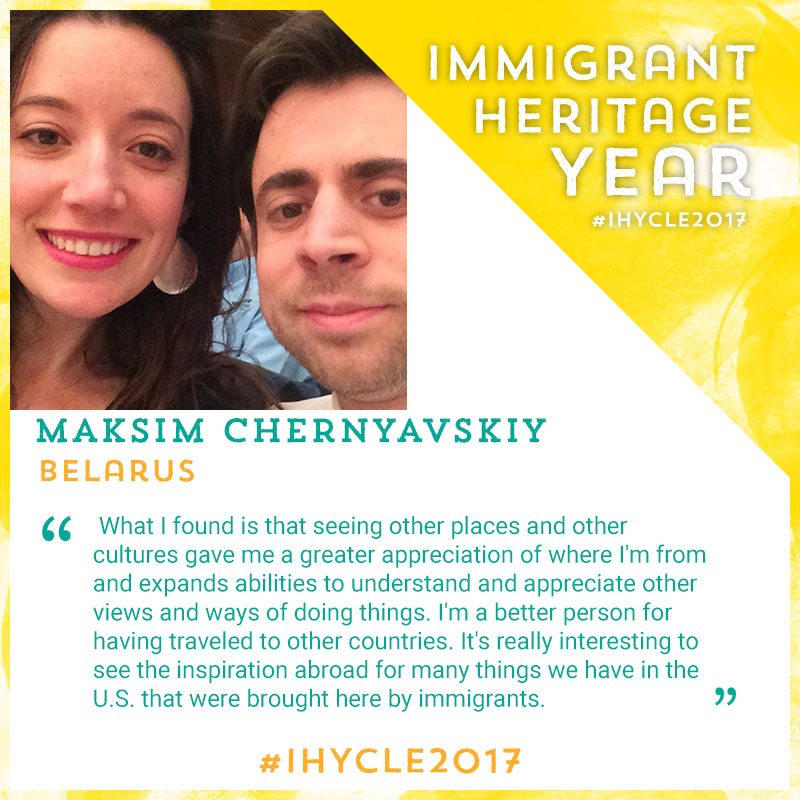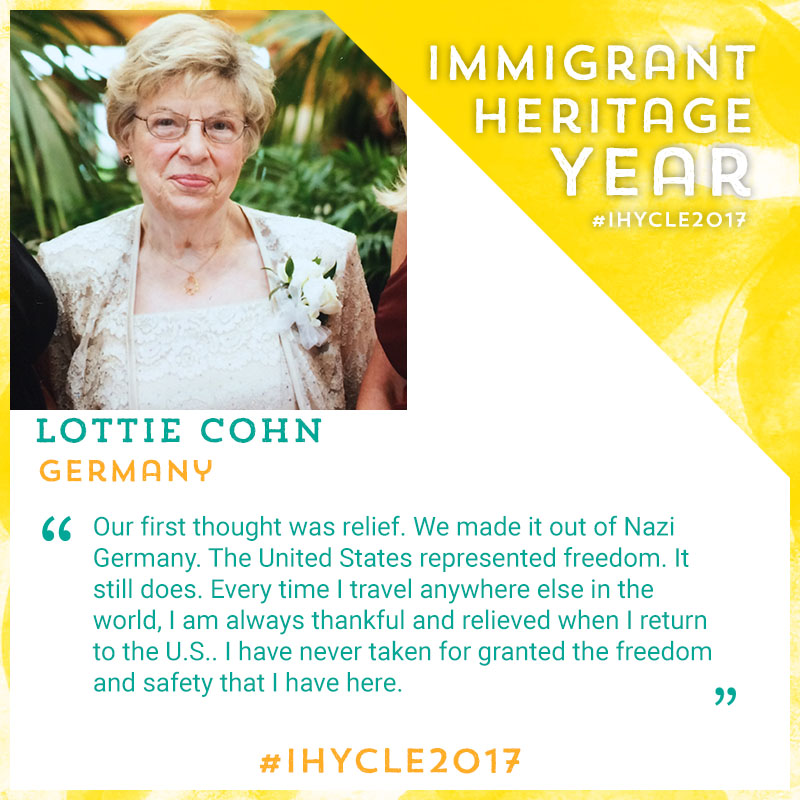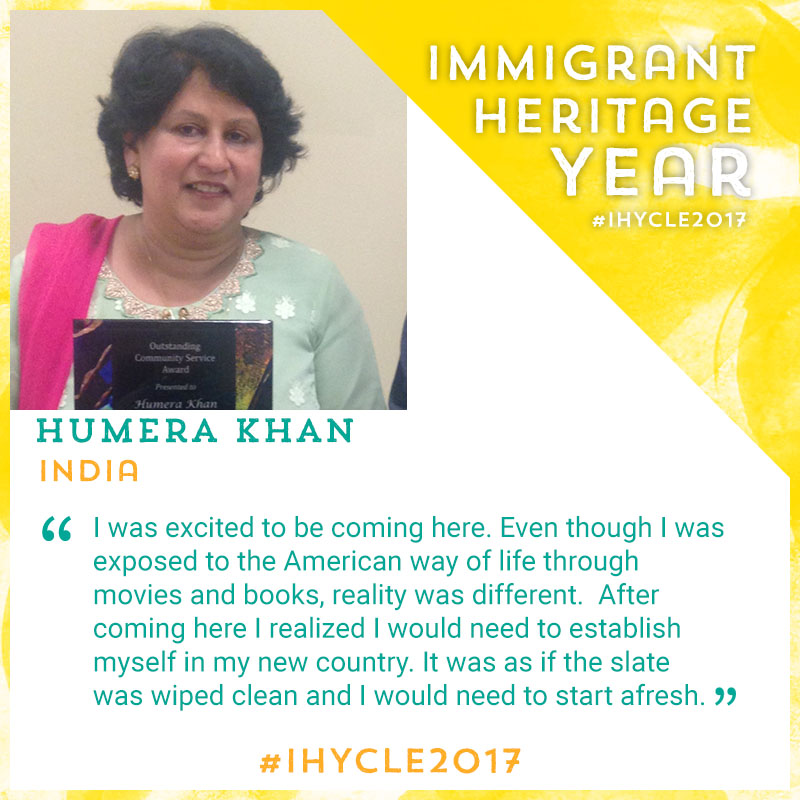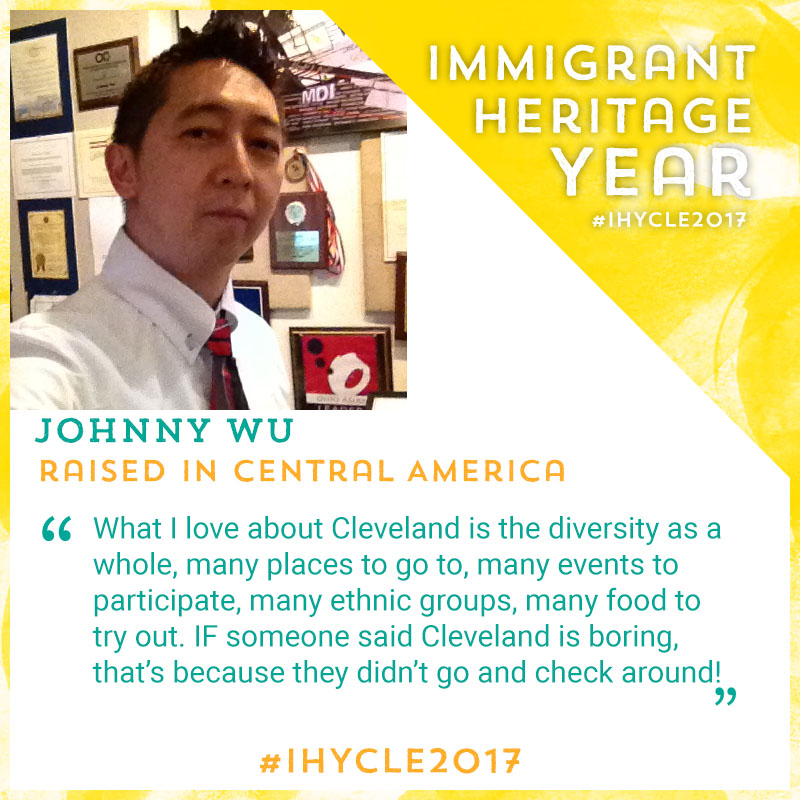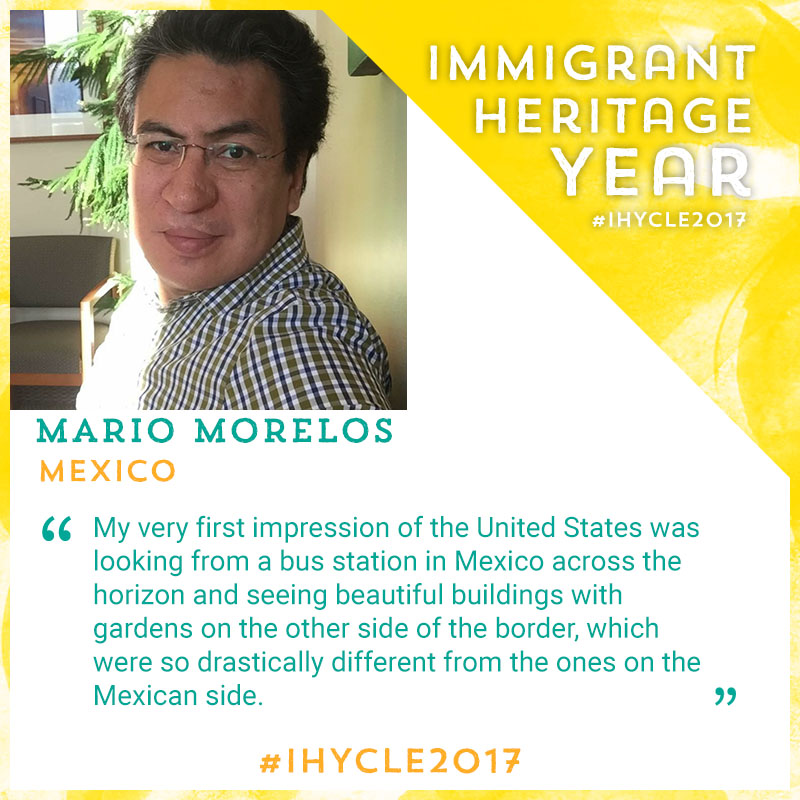Mahmoud Audu
Where are you from?
Nigeria (northern)
What was your childhood like?
Normal for the most part, asthmatic so did very little running around but pretty normal
What brought you to Cleveland?
My Dad was here in the 80s and worked with CWRU and the Veterans Administration Hospital. He went back to Nigeria in the Mid 80s and was invited back in the early 2000s by the same people to continue the work he did in the 80s. So we followed him back to finish our education.
What were your first thoughts about coming to the United States? Did those change?
Initially I had this idea of paved roads, no bad, roads, mansions, money everywhere cheap stuff. And got here and realized it was the opposite. It was really not that much more different from anywhere in the world. i.e. the movies hyped it.
What challenges did you face as transitioning here?
One of my biggest challenge was changing from imperial system to the metric system e.g. Celsius to Fahrenheit, centimeters and meters to inches and yards etc. Also the fact that you are looked at as inferior.
What is your occupation?
Applications Developer (Enterprise Content Management) or in layman terms, computer programmer.
How have other Clevelanders made you feel welcomed?
They have, I have always felt welcome here
What traditions or customs do you continue to practice?
I still practice most of my customs. I still speak my native tongue at home, eat the same foods, still perform most things and go to events just like back home (they are fewer here, but usually time permitting I find and go to them)
What do you love about Cleveland?
The quite homelike environment (great place to raise kids)
Why is it so important to welcome immigrants and refugees?
It exposes the residents to different cultures; also it shows the values of America. This is what it was founded on, different cultures and societies coming together as one.
Why is it important to travel abroad?
It exposes one to the elements, to different cultures and most importantly clears misconception
TianYi Liu
Where are you from?
I am from Beijing, China
What was your childhood like?
I have so many priceless childhood memories. I am the only child, so I was spoiled. I grew up in a neighborhood that was very famous and known for their antique stores. One of my favorite things to do after school was run in and out of every store to browse and they always gave me candy when I would stop in. Everyone was very friendly and treated each other like family which is why I enjoyed growing up their so much.
What brought you to Cleveland?
My high school in China became "sister schools" with a high school in Mentor Ohio. When they first announced this news to the whole school, I was very excited and volunteered to be the very first exchange student to study in the United States. I did not ask where I was going or when. I expressed my interest to my Chinese high school made it known how much I wanted this opportunity. Fortunately, my parents are very supportive and helped me with my decision. The next thing I knew I was on a flight to America. I did not even know I was coming to Cleveland. I thought Ohio was a city at first and that it was my final destination until the flight attendant informed me my final destination was actually Cleveland, which was a city in Ohio. After two years of studying at Lake Catholic High school, I graduated in 2013. I enjoyed my time so much and was not ready to leave which is why I decided to continue my education at Cleveland State University get my degree.
What were your first thoughts about coming to the United States? Did those change?
It was like a dream that was finally coming true. I had watched so many Hollywood movies when I was young that sparked my interest in the United States. I have always wondered what real American life was like. Now it was finally my time to explore the United States on my own. I was more excited than nervous. It still has not changed for me. It excites me every day and I am still waiting for the day that I run into Spiderman.
What challenges did you face as transitioning here?
Language was my biggest issue. I came here without knowing any English. Coming in as a junior student in high school into a private school was very challenging for me. I definitely had many culture shock moments. I dressed differently; I talked weird by not using the correct words. I had a very hard time understanding my classes and was afraid to make new friends. It was terrifying to me to stand out and be so different and to not "fit in." I started to observe more. Soon after my first year, I started to feel more comfortable to be around people, communicate with them, and make new friends. Luckily, I met many good friends in high school that were there to help me through my tough time.
What is your occupation?
I am a senior at Cleveland State University studying at Business.
How have other Clevelanders made you feel welcomed?
Cleveland is such a diverse city. When I tell people I am not from Cleveland, their eyes light up. Everyone has been so welcoming. They ask me about my culture, background and ask me what I have seen and done in Cleveland. They always try to create the best experiences for me while I am here. Local people always tell me what is going on around the city and suburbs during the different times of year to make sure I get to experience all of what Cleveland has to offer. The people here is another reason why I fell in love with this city. They made Cleveland my home away from home.
What traditions or customs do you continue to practice?
I love preparing traditional Chinese food at home. I did not know how to cook until I came to America. Sometimes I really miss home cooked authentic food. My family sends me their recipes so I can cook and it makes me feel close to home.
What do you love about Cleveland?
The beautiful environment. Where I came from is known to be one of the busiest cities in the world, traffic 24/7. Cleveland has their busy city side and also beautiful quiet urban area, its like the best of both worlds. I have grown to love the Cleveland Cavaliers and enjoy going to their games, it gives people a time to get together to celebrate. The city is so lively.
Why is it so important to welcome immigrants and refugees?
Differences are what making each of us unique. People come here because they love the country; they want to be a part of it. People need to keep in mind that the United States is known as the "melting pot" and they need to embrace that. By rejecting and turning away refugees, we ignore the purpose of humanity to care for those in need and to love the strangers among us as we love ourselves.
Why is it important to travel abroad?
Traveling is so important because it gives people a chance to see the differences in culture around the world. People become more open minded, more accepting. They start to think differently when they are exposed to more cultures, they begin to see the world differently. When we get home, home is still the same, but something in our minds has changed, which changes everything. Exposing yourself to various cultures is so vital towards personal growth.
Lee Kareem
Where are you from?
I am from Nigeria.
What was your childhood like?
My childhood was very nurturing and happy.
What brought you to Cleveland?
I work in Cleveland now; but I came to the United States as a Nigerian Scholarship Student at the University of Akron, from Brussels, Belgium.
What were your first thoughts about coming to the United States?
My first thoughts about coming to the United States were that of a unique chance at a superior higher education in the most technologically advanced and socially accommodating country in the world.
Did those change?
Yes, they began to change the moment I arrived in New York City! The technology advancement was and is still second to none; there was more crime, more socio-economic disparity than I had thought, but I also found out that the people were more welcoming and caring than I was led to believe.
What challenges did you face as transitioning here?
The challenges that I faced while transitioning here were the scarcity of equal opportunities to the economically and socially disadvantaged; more so for African Immigrants. But I also learned that if you are willing and able to work hard, you can create your own opportunities and be very successful in this country.
What is your occupation?
Semiconductor fabrication, higher education, international business development and business advocacy.
How have other Clevelanders made you feel welcomed?
I am fully integrated here. I consider myself a bona fide Clevelander.
What traditions or customs do you continue to practice?
I am very active in the Nigerian American Community in Northeast Ohio.
I strongly identify with my Nigerian Culture as regards Nigerian Food, Music, Clothing, Art and frequent visits to family in Nigeria to refresh my roots.
What do you love about Cleveland?
I love the people! Cleveland people care and that care become obvious in rough times when experiencing tough and personal challenges.
Why is it so important to welcome immigrants and refugees?
It is important to welcome immigrants and refugees because it is a fundamental human right to be able to live free and pursue happiness in a safe and nurturing environment.
It is them today, it could be you tomorrow!
Why is it important to travel abroad?
It is extremely important to travel abroad to learn that 'different' is not necessarily 'bad' elsewhere; to see how others live in order to validate or reject certain perceptions or stereotypes about cultures that are foreign to mine. I can adopt some of their culture or reject some of mine without sacrificing my own identity.
Jon Sender
Where are you from?
Cleveland, OH
What was your childhood like?
Mine was fairly average for a Jewish and middle-class child here, I'd say. I attended Jewish day school, took violin lessons, and played in an orchestra. I was pretty academically competitive as well.
What brought you to study abroad in Israel?
I had actually been to Israel before on a class trip and with Birthright, but this time I wanted to return to immerse myself in its culture and become fluent in modern Hebrew. Given my Jewish day school education, I was already quite close. I was set on studying abroad in general, and I settled on Israel because it offered a language I wanted to hone, was important to my religion and culture, and meshed with my interest in entrepreneurship.
What were your first thoughts about traveling to Israel? Did those change?
I was ecstatic and eager, knowing that I had decided I wanted to study abroad there and having planned the trip for some time. As preparation, I had begun watching Israeli TV, listening to Israeli music, and even practicing my Hebrew with locals who lived in Cleveland. As my departure approached, I became more anxious, but I knew the experience itself would only be temporary no matter what.
What challenges did you face transitioning there?
The biggest challenges I faced were getting used to the parts of Israeli society that clashed with my personality. For example, I had to learn to be more aggressive when standing in line or even shopping at a store. I also grappled with Israeli spontaneity and lack of planning in advance. Above all, I felt uneasy with the way Israelis were not transparent and took time to open up to me. However, once they did they struck me as truly genuine people.
What is your occupation? Are you a member of a sorority, fraternity, or any other civic or social organization?
I'm a graduating senior at Case Western Reserve University, and in September I will start with Deloitte Consulting in Detroit as a Business Technology Analyst. I belong to a fraternity called Pi Kappa Phi.
How did Israelis make you feel welcome?
No matter where I was or who I met, Israelis always made sure I had a place to sleep and a meal to eat. After meeting people on the street and talking to them for a bit, I received more on-the-spot dinner invitations than I can count. In their culture, it is also acceptable to come home with a friend without notice and be treated as a welcome guest. Israelis are by far the most gracious hosts I've come across.
What traditions or customs do you continue to practice?
I don't consider myself a very religious person, only attending temple on the most important of holidays. However, while growing up, my family would always hold a Friday night dinner with everyone together, a tradition known as the Sabbath meal. I try to keep it even while away at college. On occasion I attend my local Hillel, and at other times I'll cook my own version of the meal with a friend or two.
What do you love about Cleveland?
I love that Cleveland is my home. It has everything I could have asked for growing up as a kid, including good education, quality music, and friendly people. Now that I live here as a college student I realize what else the city has to offer, including an affordable cost of living, inspiring sports teams, and support for the arts.
Why is it so important to welcome immigrants and refugees?
I believe it is important to welcome immigrants and refugees because at one point in time, every family began with an immigrant or refugee. People move for different reasons, including fleeing wars, chasing dreams, and more. But wherever they end up, they ultimately support their society at its core. It is those who choose to come to America who appreciate it the most and end up inspiring the ones who grew up here, like myself, who simply take our country for granted.
Why is it important to travel abroad?
Seeing a new place and learning how other people live their lives offers us a sense of perspective. It shows us that others deal with problems we do not have, have solved problems we have not, and also emphasize values different than our own. Travel teaches us to have open minds and to understand that the world is a much bigger place than we imagined.
Maksim Chernyavskiy
Where are you from?
Gomel, Belarus
What was your childhood like?
I don't remember much about Belarus. We left when I was 3 due to religious persecution and environmental issue from the Chernobyl fallout. We lived 80 miles north of Ukraine. When we arrived we lived in Cleveland Heights and then moved to Mayfield Heights by the time I started first grade. When we moved to the U.S. both my mom and dad had to start careers from scratch. In Belarus, my mom was an engineer and my dad worked in dentistry. Their degrees and titles weren't recognized. My grandfather was the head inspector and engineer for power for southern Belarus. He was sent to Chernobyl to assist with the cleanup efforts. He wasn't able to get work in his career either. They started school again while working multiple jobs. As a result, they were always very focused on my education.
What brought you to Cleveland?
We had distant family connections to the city and there is a large Soviet population here.
What were your first thoughts about coming to the United States? Did those change?
I don't remember. I was too young. My family always believed that with hard work and dedication anything was possible and they heard on the radios and through hear say that you could succeed in the U.S. with hard work and determination. That was a big driver for them applying to come here.
What challenges did you face transitioning here?
Language, culture. Essentially, starting from scratch was difficult. Reputation was important in Belarus and here no one knew who we were or my family's accomplishments and qualifications.
What is your occupation? Are you a member of a sorority, fraternity, or any other civic or social organization?
I am a Business Manager for an aerospace company. I am a Fiji (Case Western Reserve University) and Summer of the Cuyahoga alumnus.
How have other Clevelanders made you feel welcomed?
I grew up here and identify first as a Clevelander, but people went out of their way to help my family transition to the culture and city.
What traditions or customs do you continue to practice?
We speak Russian and my mother cooks traditional food. We celebrate New Years, one of the most important holidays in our culture, as well as some Jewish holidays.
What do you love about Cleveland?
The people, the heart of the city, and the pride in our community and what it has to offer. Also, the friendliness of the people who will go out of their way to introduce you to and show you the city.
Why is it so important to welcome immigrants and refugees?
The city is made of them. This is Cleveland. This is who we are. Our main commonality is that everyone is different but open to differences.
Why is it important to travel abroad?
With work I did a lot of traveling early in my career and what I found is that seeing other places and other cultures gave me a greater appreciation of where I'm from and expands abilities to understand and appreciate other views and ways of doing things. I'm a better person for having traveled to other countries. It's really interesting to see the inspiration abroad for many things we have in the U.S. that were brought here by immigrants.
Lottie Cohn
Name:
Lottie P. Cohn
Birthplace:
Germany (now U.S. citizen)
Where are you from?
Germany. I was born in Bonn and grew up in the town of Altenkirchen.
What was your childhood like?
It was nice until the Nazis took power. Once the Nazis took power I was afraid to go out in the streets. One day while walking to school, a teenage boy slapped me across the face and called me a 'dirty Jew'. I had never been slapped before and the incident sticks with me through today. After that, I started going to a Jewish school since I was no longer allowed to go to the town school with my friends and really didn't want to after that. The Jewish school wasn't bad but I missed my friends. I had one neighbor friend--we were really close--and her parents still let her play with me after no one else would. Still to this day we write to each other.
What brought you to Cleveland?
After Kristallnacht, my father was arrested and taken to Dachau. He was released after a few weeks because he had fought in World War I for Germany. He had seen enough and contacted his friend in Holland, who helped him get out of Germany. My parents had luckily collected all of the paperwork and passports we would need, and we made it out of Holland on the last boat before the passageway was taken over by the Nazis. We sailed to NYC and stayed there at first. We came from a small town in Germany and NYC was overwhelming. My parents worked with an agency to help us with a transfer to another city. My parents were given the choice between moving to Pittsburgh or Cleveland and chose Cleveland only because they had met someone on the boat from there. Cleveland was a much better fit. I went to school right away and made friends immediately.
What were your first thoughts about coming to the United States? Did those change?
Our first thought was relief. We made it out of Nazi Germany. The United States represented freedom. It still does. Every time I travel anywhere else in the world, I am always thankful and relieved when I return to the U.S.. I have never taken for granted the freedom and safety that I have here.
What challenges did you face transitioning here?
I had a difficult time with how overwhelming NYC was. I had taken English in Germany, so I was able to meet friends and follow along in school right away. My mother had also learned basic English in Germany and was able to get a job at American Greetings when we moved to Cleveland. My father never learned English and found it easier to just teach everyone else German. In Germany, he had owned his own shop. He had to learn a new trade here and worked in a factory. Both of my parents were very hardworking and always felt lucky to be here, even if things were sometimes difficult.
What is your occupation?
I am long retired, but I used to work for the American Jewish Committee and I was a Sunday School teacher. I always loved to work and learned that from my parents. My first job was at American Greetings with my mom. I worked there in the summers.
How have other Clevelanders made you feel welcomed?
When we arrived, they were nice. We didn't make many friends in NYC but people were open to meeting us in Cleveland. I made friends very quickly when I moved here. People are just friendlier in Cleveland than anywhere else.
What traditions or customs do you continue to practice?
I celebrate the Jewish holidays with my family and cook traditional foods, but I'm more distant from German culture. When I moved to the U.S. I wanted to be as American as possible. Most of my friends from Germany were the same way. But I grew up speaking German at home with my parents.
What do you love about Cleveland?
I love how welcoming the city is and how friendly the people are. My family is here, my life is here, and I feel safe and comfortable here.
Why is it so important to welcome immigrants and refugees?
It's easy to forget sometimes that the life you're leading isn't the same as the life others are leading across the world. Many people come here because they can't live in their homes. It's not safe. We have a responsibility to take care and protect others who are just trying to live better, safer lives---especially those of us who were lucky to come here as immigrants and refugees ourselves.
Humera Khan
Where are you from?
New Delhi , India
What was your childhood like?
Lots of fun with loving and understanding parents and siblings who were close in age.
What brought you to Cleveland?
My husband was here and I came to join him.
What were your first thoughts about coming to the United States? Did those change?
I was excited to be coming here. Even though I was exposed to the American way of life through movies and books, reality was different. After coming here I realized I would need to establish myself in my new country. It was as if the slate was wiped clean and I would need to start afresh. I came to Cleveland in April, and was surprised to see how excited everyone got when there was a sunny day, but after one winter I could understand why!!!
What challenges did you face as transitioning here?
Had to fit into the new environment which was out of my comfort zone. Many things were different, the food, the driving on the right side of the road versus the left which I was used to. The American English versus the British English which I grew up learning. We spelled Check as Cheque and so on.
What is your occupation?
I have been working with Progressive insurance for the last 15 years. I am very involved in my mosque and community, and other interfaith work . I was on the executive at my mosque for more than 10 years
How have other Clevelanders made you feel welcomed?
I was lucky to have some family here already so it was not too lonely, though I did miss home. Everyone was very friendly and welcoming and now after more than 30 years Cleveland is home.
What traditions or customs do you continue to practice?
I keep up with my religious holidays and traditions. We celebrate our religious holidays with community events and our favorite foods !!!
What do you love about Cleveland?
It is a easy city to live in , very affordable and convenient . By March most winters, I think about moving to a warmer place but this year has been great.
Why is it so important to welcome immigrants and refugees?
The more welcome a person feels , it is easier for them to fit in and get on with life.
Johnny Wu
Where are you from?
Cleveland, Ohio, raised in Central America, Panama
What was your childhood like?
Being son of the diplomat, we get to travel all over, and also get to learn to be spoiled, but when we no longer are diplomat (dad retired) we learned the hard way and strive for the best, I moved back to Cleveland because I was born here but never experience the city. Love it, many times was going to move away be ultimately decided to stay here.
What were your first thoughts about coming to the United States? Did those change?
When first step into the US, it was quite interesting, especially Cleveland, felt like a big city but now, it’s a city just right for me.
What challenges did you face as transitioning here?
My first language was Spanish and then English and then Chinese so it wasn’t a hard transition, but the most that I experienced here was the racial issue, where when I dress in suit and tie, people tends to think I’m visiting Cleveland, which is why most of the time, I avoided dressing up lol
What is your occupation?
Owner of Media Design Imaging, we produce, direct, and deliver video production with branding/marketing and also for events.
How have other Clevelanders made you feel welcomed?
I’ve experience Cleveland from being probably one of the warmest city (in term of people friendliness), everywhere I’ve worked on I always experience a welcoming, the only time is when I dress up, then I get to be ‘profiled’ to be foreigner.
What traditions or customs do you continue to practice?
Lunar New Year, parent’s birthdays
What do you love about Cleveland?
The diversity as a whole, many places to go to, many events to participate, many ethnic groups, many food to try out. IF someone said Cleveland is boring, that’s because they didn’t go and check around!
Why is it so important to welcome immigrants and refugees?
Make them feel at home, most of the time, any ethnic group or visitors would prefer knowing that their culture is well represented in Cleveland, so the more it connects them to their hometown, the more chances they would consider to reside in Cleveland and call Cleveland home.
Why is it important to travel abroad?
Experiencing different culture broaden one’s experience of the world and understanding different culture helps understand diversity as a whole.
Mario Morelos
Where were you born, and how did you come to Northeast Ohio?
I was born in Mexico City and I came to the U.S. after some of my sisters relocated here and they invited me join them. I am the second youngest of seven children. Years later, I decided to move to Madison, Wisconsin in search of better opportunities and in hopes that I would improve my language skills. My brother had recommended that I look into moving to Madison after spending a summer there. That is how I met my wife, who was a student at the University of Wisconsin. Together we decided to live in Costa Rica in 1998 and in 2000, we moved back up to NE Ohio where she is originally from. This is where we decided to stay and raise our family.
What were your first thoughts about the United States? Did those change?
My very first impression of the United States was looking from a bus station in Mexico across the horizon and seeing beautiful buildings with gardens on the other side of the border, which were so drastically different from the ones on the Mexican side.
Once in the U.S., it seemed to me that people were very refined and formal, maybe because I did not understand English. I assumed this because the U.S. as a country is more developed, organized, and has many rules compared to the chaos of Mexico City. After learning more English, I realized that that is not necessarily the case.
What challenges did you face transitioning here?
Not knowing the language was the biggest barrier, and not understanding the culture and social cues did not help that fact. I often found myself missing friends from back home in Mexico City. Making friends with non-Spanish speakers was a challenge. That said, I knew pushing myself to learn English by conversing with new people would be much more beneficial than trying to surround myself with only Spanish-speaking friends. I made it a goal to gain more knowledge about anything I could to pursue a better life.
How did Localingua get started?
After working for years as a freelancer for a translation agency, I began work as their in-house sales manager before deciding that I really wanted to follow my lifelong dream of starting my own business. Coincidentally, I live right next to one of the leading schools in the country for translation and one of graduates from the program was willing to help me in my endeavors. In 2006, with one laptop and different varieties of translation software, the business began to take form. Soon, I found myself attending networking events and translation association conferences to find our first clients and establish our business.
Are you a member of a sorority, fraternity, or any other civic or social organization?
When I was in college, I was a member of the Latino Student Association and also the Student Economics Organization because that was my major.
Additionally, I participated in events with the Hispanic Chamber of Commerce.
I have been a member of the NEO STC (Northeast Ohio Society for Technical Communication) for a long time, and, together with the PR committee, earned the STC Award of Excellence in Public Relations in the Northeast Ohio Community. I am also a member of the American Translators Association. Both are technical and professional organizations and I am always looking forward to their events in order to network and learn more about the industry.
How has the community made you feel welcomed?
For the first few years, I was a non-traditional full-time student and I really enjoyed it. In addition to working from home and later starting Localingua, I opened a bike shop because I wanted to engage the community and really contribute to it.
I have always felt that I have been welcomed here and I believe that taking an active role in being part of the community has helped that.
What traditions or customs do you continue to practice?
Day of the Dead as been my favorite holiday for as long as I can remember. Between making the traditional foods, listening to the music, and enjoying the colors, I have so many fond memories of this celebration. To this day, it is very important to continue tradition in my house.
I always try to keep up with speaking Spanish, even at work, where I can speak Spanish with all of my employees.
Dancing has been a huge part of my upbringing as well, especially salsa!
What do you love about Cleveland?
Cleveland has great entertainment—music, tourism, restaurants and cultural variety all keep things fresh and exciting. It is a city of true resilience which continues to thrive. I love being able to go downtown to see entertainers, like the late Celia Cruz and Louis CK, with my family we enjoy going to the West Side Market and cheering on the Cavs.
Why is it so important to welcome immigrants and refugees?
We really are a great human resource and we have a lot to offer in the way of diverse experience and a resilience that most Northeast Ohioans share. Turning a blind eye to the full potential of the positive ideas and energy that these people bring could be a huge loss to the community. We provide a richness to the culture by bringing our own personal stories and experiences and truly work to improve our surroundings in pursuit of a better life, which in turn improves the lives of those around us.
Runah Assad
Where are you from?
I was born and raised in Cleveland, Ohio and I am first generation Palestinian American.
What was your childhood like?
My childhood growing up was great! Most of my family lived near me and we would have family gatherings weekly. If there wasn't an occasion, we would make one just to spend time together.
What brought you to Cleveland?
My family first immigrated to Dearborn before settling in Cleveland. My entire family (aunts, uncles, and cousins) decided it had better job opportunities.
What is your occupation? Are you a member of a sorority, fraternity, or any other civic or social organization?
I have my degree in Dental Hygiene, but I currently work for a non-profit organization called Salaam Cleveland that helps refugees and people within the community that are in need, with the essentials to call Cleveland their home.
How have other Clevelanders made you feel welcomed?
Since wearing the hijab (headscarf), there is often the misconception that I was not born in America. So when asked about my religion and culture by community members, they tend to go out of there way to get to know me as well as my beliefs, which has been a nice surprise. Who knew a piece of cloth worn on my head would be a great conversation starter?!
What traditions or customs do you continue to practice?
Something I love within the Palestinian community in Cleveland is that they try their best to pass down customs and traditions. From our foods like maklouba and kanafa, to our dances like the dabkah, they have stayed intact for many generations. Not only this but to welcome people into your home and make them feel apart of your family is a huge custom that is never neglected.
What do you love about Cleveland?
I have grown to love Cleveland very much through the different communities I have had the opportunity to connect with. Cleveland is a great place especially as people stand united and support each other despite their differences.
Why is it so important to welcome immigrants and refugees?
Although you may not be an immigrant or refugee yourself, someone in your family has been. Coming to a new land can be difficult and scary, because you are leaving everything you have known behind you. If only we could walk in each others shoes... That is why it is important to welcome immigrant and refugee, to let them know they are not alone here and we support them. Not only should that be our communities goal but it is the goal of Salaam Cleveland.
Why is it important to travel abroad?
I have been blessed to travel to a few hispanic countries like Costa Rica, Panama, Belize, and Puerto Rico, as well as a few middle eastern countries, like the Palestine, Jordan, and Saudi Arabia. We are all humans. Sure we have differences, but to experience each others cultures is amazing. To see the ancestry of each land and compare it to your own, you would be surprised with all of the similarities.

